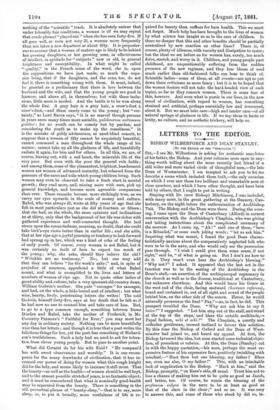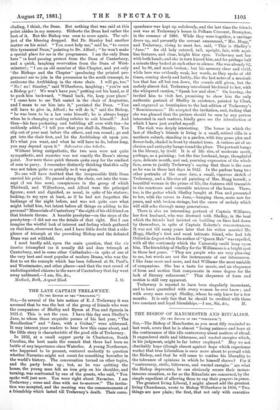LETTERS TO THE EDITOR.
BISHOP WILBERFORCE AND DEAN STANLEY.
[TO THE EDITOR OF THE " SPECTATOR:1
Sra,—I see Mr. Wilberforce is asking for authentic anecdotes. of his father, the Bishop. And your columns seem open to any- thing worth telling about the more recently lost friend of a still wider and more varied circle of thoughtful men,—the late Dean of Westminster. I am tempted to ask you to let me• describe a scene which included them both,—the only occasion. on which I ever saw these two brilliant and remarkable men at close quarters, and which I have often thought, and have been told by others, that I ought to put in writing.
Staying with Dr. (now Bishop) Mitchinson, I was included', with many more, in the great gathering at the Deanery, Can- terbury, on the night before the enthronisation of Archbishop Tait. The Bishop and the Dean were there. Daring the even- ing, I came upon the Dean of Canterbury (Alford) in earnest conversation with the Archbishop's Chaplain, who was giving and taking instructions about the complicated ceremony of the morrow. As I came up, " Ah !" said one of them, " here is a Ritualist," or some such joking words ; " let us ask him." Inquiring what was meant, I found the good Dean charac-- teristically anxious about the comparatively neglected folk who, were to be in the nave, and who would only see the procession pass through. " I wish I could give them some sense, if not sight," said he, " of what is going on. But I don't see how to- do it. They won't even hear the Archbishop's blessing.' " Why not ?" I asked. It appeared that the last act in the function was to be the seating of the Archbishop in the- Dean's stall,—an assertion of the archiepiscopal supremacy in the church as well as in the diocese, traditional at Canterbury,. but unknown elsewhere. And this would leave his Grace at the west end of the choir, facing eastward (horresco referems), boxed and curtained in, out of all sight and sound of the people- behind him, on the other side of the screen. Hence, he would naturally pronounce the final " Pax,"—as, in fact, he did. This prospect troubled the Dean. " Why not ask him to say it twice ?" I suggested. " Let him step out of the stall, and stand at the top of the steps; and bless the outside multitude,— Papal fashion, urbi et orbi ?" The Chaplain, a courtly and orthodox gentleman, seemed inclined to favour this solution. By this time the Bishop of Oxford and the Dean of West- minster had joined us, and heard my appeal. At first, the Bishop favoured the idea, but soon started some technical objec- tion, of precedent or rubrics. At this, the Dean (Stanley) cut in with the happy quotation,—his nose, perhaps the most ex- pressive feature of his expressive face, positively twinkling with mischief,—"Hast thou but one blessing, my father ? Bless me, even me also, 0 my father !" This, with an inimitable look of supplication to the Bishop. " Hark at him," said the Bishop, promptly, " on Esan's side, a% usual. Trust him not to lose a chance of making him out to be quite as good as Jacob, and better, too. Of course, he wants the blessing of the profanum vulgue in the nave to be at least as good as that of the elect in the choir ;" and so on. It was easy to answer this, and some of those who stood by did so,
eluding, I think, the Dean. But nothing that was said at this point abides in my memory. Hitherto the Dean had rather the best of it. But the Bishop was soon to score again. The sub- ject of the blessing dropped. But Dr. Stanley had another matter on his mind. " You must help me," said he, " to coerce this tyrannical Dean," pointing to Dr. Alford ; " he won't make a special place for me in the programme. I am the only Dean here " (a loud passing protest from the Dean of Canterbury, and a quick, laughing reservation from the Dean of West- minster) ; "I am an old member of this Chapter, and yet only the Bishops and the Chapter' (producing the printed pro- gramme) are to join in the procession to the south transept, to enthrone the Archbishop in the stone chair. I will go, too." " No ! no ! Stanley," said Wilberforce, laughing ; " you're not a Bishop yet ! We won't have you," putting out his hand, as if to push him backward. " Stand back, Sir, keep your place." " I came here to see Tait seated in the chair of Augustine, and I mean to see him into it," persisted the Dean. " You will have to give in, Alford ; he will do it," said the Bishop, " he was born to be a law unto himself ; he is always happy when he is changing or making rubrics to suit himself." And then—his face puckering and bubbling all over with fun—he suddenly added, " I tell you what you shall do, Stanley. You slip out of your seat before the others, and run round ; go and get into the chair first, and let the Archbishop sit upon you. It's what you want, and what he will have to do, before long, you may depend upon it." Sotountur ride tabu/cc.
Without being antipathetic, the two men were not quite sympathetic, and repartee was not exactly the Dean's strong point. Nor were these quick thrusts quite easy for the readiest of men to parry. I remember distinctly thinking that this sally was not taken quite so genially as it was given.
No one will have doubted that the irrepressible little Dean carried his point. He passed along the choir, out into the tran- sept (I see him now), conspicuous in the group of which Thirlwall, and Wilberforce, and Alford were the principal figures ; erect and dignified, as usual, in spite of his stature ; looking, to my eyes at least, as if he had not forgotten the badinage of the night before, and was not quite sure what might befall him, but intent before all things on adding to his personal "Memorials of Canterbury" the sight of his old friend on that historic throne. A humble presbyter—on the steps of the presbytery—I did not see the details of that sight. But I can imagine the wistful look of interest and feeling which gathered on that keen, observant face, and I have little doubt that a side- glance of triumph at the provoking Bishop and the defeated Dean was not withheld.
I need hardly add, upon the main question, that the vie inertice triumphed (as it usually did and does triumph at Canterbury, and in some other Cathedrals)—in spite of one of the very best and most popular of modern Deans, who was the first to set the example which has been followed at St. Paul's, and Westminster, and other places—and that the vast crowd of undistinguished citizens in the nave of Canterbury that day went away unblessed.—I am, Sir, &c., Matlock, Bath, August 22nd. J. 0.































 Previous page
Previous page